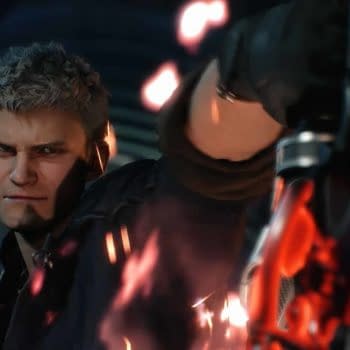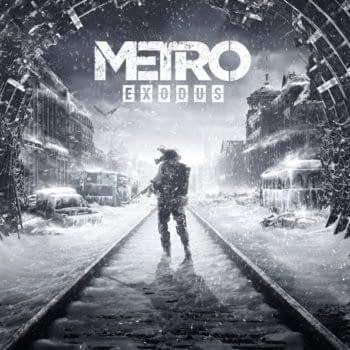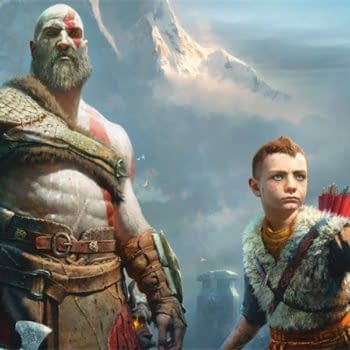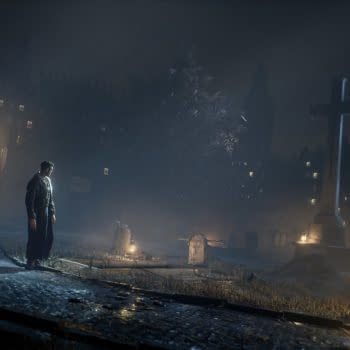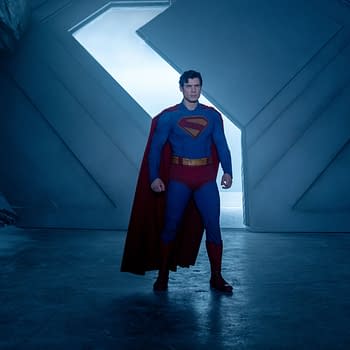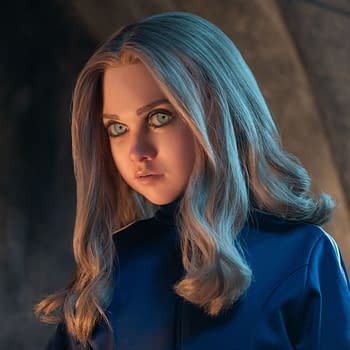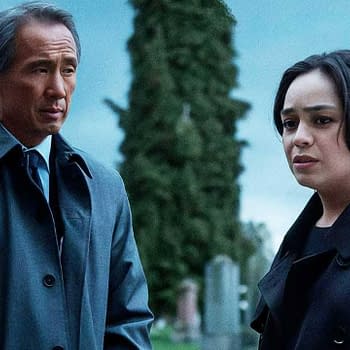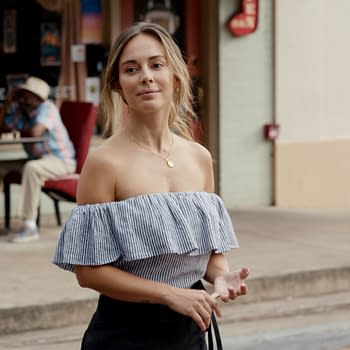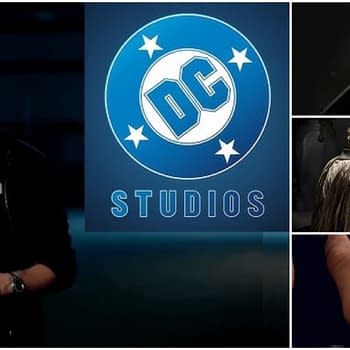Posted in: Movies | Tagged: arvind ethan david, Comics, dirk gently, dirk gently's holistic detective agency, elijah wood, film, max landis, tv
Stuffed Corgi Traumatizes Dirk Gently Executive Producers: Interview With Arvind Ethan David And Max Landis About Dirk Gently's Holistic Detective Agency
By Octavio Karbank
A little over a week ago I found myself with the unique opportunity to sit down with writers Max Landis and Arvind Ethan David and talk about Dirk Gently. Not just the comic, mind you, but the upcoming TV show as well. For those who are curious, it debuts tonight. I'll admit, I wasn't too familiar with the infamous Dirk Gently and his quirky adventures before the interview. I'd read one or two comics, I knew Dirk Gently was a creation of the legendary Douglas Adams, and for some reason reminded me of the Doctor from Doctor Who, but that was about it.
Now back to Mr. Landis and Mr. David. I've been a fan of Max Landis before I even knew who Max Landis was. Chronicle was probably the movie that did it for me, but his spiel on YouTube about the Death of Superman, really cemented my appreciation for him. Sure, he's a kooky dude, but many of us are and there's nothing wrong with that. While I'd met him a couple times before, most notably (for me at least) at San Diego Comic Con several years ago, sitting outside Hall H and engaging in a game of Duck-Duck-Goose with him and others; it was a trip.
Since then, I've been looking for the chance to chat with Mr. Landis about, well, anything. Fortunately, the situation presented itself and I found myself talking to not just him, but the exceptional Arvind Ethan David, writer of the Dirk Gently play, Dirk, and the writer of the current comic from IDW. If you're in the market for a groovy read, Dirk Gently is for you. From what I've seen and heard about the upcoming show, I think we're in for a wild ride. What follows is the adventure that was my interview with both Arvind and Max. I'd like to point out this was one of those rare interviews where I didn't have to do much, as the two men were more than happy to answer questions at length, going back and forth with fabulous rapport.
As the interview started Max was busy running to and fro like a jackrabbit on too much Surge, so to give us both a little time to settle in, I decided to first talk to Arvind about the IDW comic, Dirk Gently: The Salmon of Doubt.
Octavio Karbank: Let's start with talking about your comic and what it's about. You know, for the people who don't know about Dirk Gently.
Arvind David: The comic and the show take the Douglas Adams character, Dirk Gently, who is a holistic detective, which is to say that he's a detective that doesn't look for clues; the normal methods of deduction don't work, or at least not for him. Instead, Dirk has a strange, quasi-mystical, quasi-psychic relationship with what he calls "the interconnectedness of all things", which means he senses reality at a kind of quantum level. He uses that ability, that blessing, that curse, to solve what appear to be ordinary crimes, but have extreme solutions. That's what we're doing in the comics. Douglas Adams, who created The Hitchhiker's Guide To the Galaxy, wrote two Dirk Gently novels; both the comics and the TV show carry on his adventures.
OK: So can anyone just pick up the comic?
AD: Absolutely! If you've never read the comic, or the books, you can pick up the first issue or watch the show and we hope you'll just find yourself on for an amazing ride!
OK: So what's the process like, in trying to sit down and write a Dirk Gently comic?
AD: Coming from a TV background, I care a lot about structure, and comics force you to do structure even more, because they are short and you have to think concisely. Generally I'll break down the whole arc of the series, or mini-series, write that down in ten pages, send that to my editor and the artist, and talk about it a bunch.
For example, in the first arc of Spoon Too Short, I knew I wanted to have interdimensional aliens poach something from humans, but I couldn't figure out what was the funniest thing for them to poach. I had figured out the characters, but I couldn't figure out the funniest thing to poach, so I asked Max and he said, "People's voices…you should make them mute," and I thought that was the funniest thing. So that's what we did. Once we do that, the writing of the individual issues is pretty fast, aside from anything else, like I have to produce the TV show and I have another comic that I'm writing. I have to be able to write anytime that I have time. So I write on set, I write in between takes, I write in the edit room; I'll be editing the show with the editor, giving him notes and I'll turn around and type. My other comic I wrote, I wrote on an entire train ride to San Diego from L.A. It's a thing Max and I have in a common, we both write really fast. And then re-write.
OK: What does Dirk Gently mean to you and what do you think he could come to mean for others?
AD: What he means to me is kind of bizarre and particularly special, because my life and career started when I adapted this as a play when I was sixteen years old. I got to meet Douglas Adams and he became a mentor and a friend, and twenty-something years later, here we are with comics and TV shows. The play has been translated into many languages and is performed around the world, we're doing a board game; it's all just insane! To me, Dirk is so interconnected with everyone I know; every job and every thing I've ever done. It's been profound to my life. In a weird way I hope the show and the book will come to mean to other people to look for interconnections. It is those interconnections that have meaning, right? If you believe in God and so on, fantastic. If you don't, you're left only with other people. Dirk, and this is very true of the Dirk in the show, is ironic because he's so keen to be connected, and he's not. He's incredibly lonely and unconnected and I think we can all emphasize with that. Even people like us, who appear to be popular and well liked, often feel very unconnected and lost. On a human level, that's what the show, and the book, is about.
(Realizing we still hadn't talked about the show, I figured it was time. It was here that I experienced the energy Max Landis is known for; rarely have I encountered someone with such unbridled enthusiasm for what they do.)
OK: Great answer! Can we talk about the show, Max?
Max Landis: Of Course!
OK: Let's talk about how you got on Dirk Gently and how the show came to be.
ML: Two ways. I met Arvind several times before, and we expressed a mutual affection for Dirk Gently. The producer of the show, and the guy who works with Arvind, David Alpert, is my former manager and was waiting to find something to work with me on. Arvind had been waiting to get the rights to Dirk Gently back and had brought it up to me in the past, and when the rights came back, since David was a producer on it and Arvind having a level of creative control, it just seemed like an opportunity I couldn't pass on.
OK: Why do you like the character so much?
ML: I like the idea so much because you can go anywhere and do anything! It has less rules than Doctor Who. As long as it's in the universe, Dirk might run into it. The great thing about that is that it forces you to think bigger than just aliens and dumb science fiction stuff. It forces you to go, "What the weirdest thing that could happens," and that's on the table because everything is connected.
OK: I know you've talk about this before, but can you talk about taking Dirk Gently from the page to the screen?
ML: I've said it so many times, that at this point it's almost a sound bite, but I really believe that Douglas Adams is the main character in any Douglas Adams book. His stories are incredibly compelling because of the ways they're told and the ideas in them. Yet at the end of the day, when you say there's a planet with living mattresses on it, and you talk about it at length…that's special; that's a literary device! That's what great about it, talking about Vogon poetry or the proper way to fly; when you read that you fall to the ground and miss, it's brilliant, but when you see someone do it, what's special about that?
AD: Douglas's genius was ideas, language, and character. It was not plot. Plot was often an afterthought for Douglas. Like on page two hundred or something he would suddenly remember that he needed to solve the plot in some way. When he saw the play, I was really nervous, because I had totally changed the plot of the book, and he was like, "You fixed it!" So when we started, we decided that we're not going to adapt the books. We're going to take the style and the attitude and the tone of the character and add all new adventures, which is what Max has done brilliantly in the show. The thing about Douglas, and I hate it when people say they write themselves, because that negates what we do, but once we create the scenario, and you know Doug as well as Max and I do, you know how he would approach that scenario.
ML: Yeah, you can find his reaction to things pretty quickly. Our version of Dirk is also much more human and vulnerable than he is in the books. The one in the books is quite glib and dark.
AD: He's like an older more cynical version of our Dirk.
ML: Yes! Our guy is still a bit starry-eyed and energetic, happy even in the face of certain death; also terrified, but he alternates quickly and doesn't focus too much on the emotions he's having as he's having them.
AD: He's very kitten-like.
ML: He's very much like a kitten!
AD: Like, I have two cats and they fight viciously all the time. And then they'll stop and be best friends. It's exciting! Dirk is like that, it's like, "Oh, you just hit me?! Hello!".
ML: It's almost like a baby, where his reset button is very easy to trigger. So he'll be terrified and crying and freaking out, but then something will literally distract him and he'll be happy and smiling again, which is hard for those around him.
OK: What have been the most challenging and rewarding aspects of this entire process?
ML: Challenging is by far the practical stuff. I wrote the $150 million version of this show, because I didn't want to compromise and I intend to continue writing that way! Because we're forced to compromise and those forced compromises actually work out, rather than trying to pre-game how to make the show affordable. Watching certain elements of the show and not being able to execute it exactly the way I saw it in my head was troubling to me, but the best part of it, is that unlike anything else I've done, barring Chronicle and the stuff I do on YouTube, the rest of it is exactly how I saw it in my head, because I'm there! People respect me enough to listen to me. Smart people like Arvind and Rob! It was very strange for me to be able to go, "And then this happens," and to have a room of people go, "Yup!" or go "Can we do it this way so that we can actually afford to do it?" Instead of what you hear on studio pitches where I'll suggest something and everyone will go "No!" So the best and the worst things were tied inextricably to each other. How much I couldn't do was the worst thing, but how much I could do was amazing!
AD: And also how the couldn'ts drove us to better solutions. The great thing about a TV show as opposed to a movie is that it's a living organism. You're editing an episode one as you're shooting episode three and while you're writing episode eight and you can change things or go back and shoot something new and add stuff.
ML: That's the best thing ever!
(Little did I know what my next question would lead to. I mean, you get used to going on tangents during interviews, but some tangents are more phenomenally ridiculous than others.)
OK: You've both worn many hats over the years. Can you talk about how they differ from wearing the hat of television?
ML: It's all measures of collaboration and control. When I do a comic, that comic is exactly how I wanted it to be. There's a zero percent difference, like in the American Alien and the Green Valley scripts. The comics might turn out better due to the artist, but the level of collaboration is itsy-bitsy.
AD: Right, because as the writer, you're also the director, the costume designer, and the cinematographer. You can dictate.
ML: You can do anything you want. You also work with the artist, and they do a lot of the work, so it's two people doing every job. When I do my YouTube videos I have total control, but then the first measure you start to feel is time; other people's time. You film this and you film that; how much of your time have I taken? Then, you go a level up to films, and suddenly there's a massive sphere of collaboration. Anyone who takes sole credit for a film is either a liar or an egomaniac, or just stupid, but often all three. This is Hollywood after all. There's a tremendous amount of different artists who make a collage; that's a movie. They're never the same twice, ever. The process is different, different people have control; the script is often torn to pieces and changed fundamentally. Then there's TV.
AD: One of the things about films is that the numbers are gigantic. So even if you're a filmmaker of great repute and integrity, working with a writer of great integrity, it's still the studio's decision and that is a thing that has happened more and more in the last decade as average budgets have gone up to hundreds of millions on blockbusters.
ML: On blockbusters that I would've written in the 90s.
AD: On smaller films, you can go back to the YouTube thing.
ML: But you still get caught up against directors, people you don't agree with and against people who work with that seemed great when you hired them. Films are generally one-offs and you can't fix anything.
AD: It's not an accident that a lot of great films and great filmmakers use the same teams over and over. Woody Allan's team, except for those who have died, has essentially been the same for fifty years. Same with Tarantino's team and Scorsese's team; there is a reason for that. TV lets you build that team.
ML: TV is the final sphere and it's crazy because it's shockingly different from film. Everything overlaps into itself. You are solving things in real time and working with a team to make it work, because if anyone isn't making it work they're now the squeaky wheel and they are slowing you down. You're running up against every measure: time, money, talent, weather, location, and even the earth itself! Suddenly creative freedom means nothing in the face of God! It's shocking!
AD: And sometimes it helps you! Here's the bizarre thing. There is, as you may have noticed, a corgi in the show. I don't know if you know this, but corgis are meant to be very smart.
ML: Oh my god, this is the best example ever!
AD: So we start with this corgi and the first thing we discover is that corgis are really heavy. There are scenes when Elijah [Wood] had to run while carrying the corgi and the first task was to find the lightest corgi available. I kid you not. Unfortunately the lightest corgi we could find was quite young, and it being quite young meant that it was still pretty stupid, meaning it was basically untrainable.
ML: It was a diva!
AD: And there was a scene in episode eight where we needed it to play dead completely and the point when we were filming episode two, we thought there was no way that corgi would ever do that. So then we started investigating getting a stuffed corgi. Everything in film and TV is expensive.
ML: More expensive than it should be, by the way.
AD: If you go and buy a regular cake, it's probably like, fifty bucks. Yet a wedding cake is about five hundred bucks! Same is true with stuffed corgis! You would think that you could go and buy a stuffed corgi for fifty bucks. No! We had one custom made for four thousand dollars!
ML: Four thousand dollars and it looked like a pillow that sort of looked like a corgi!
AD: So then we go, "Eff this, we have to use the real corgi," but then we realize how stupid the corgi is and think there's no way the corgi is going to do it! Episode eight is coming like a truck towards us, there's no way to re-write this, it's crucial to the plot that the corgi plays dead…
ML: And we've already sacrificed several scenes where the corgi would've been in danger because we don't have a good stuffed corgi! So we've lost elements of the plot in the script!
AD: I love animals, but I started having conversations about whether we could drug it, can we buy a dead corgi…what can we do? This is what happens and it's amazing! Episode eight is three months after episode two, the corgi grows up, the corgi grows older and gets smarter and nails the scene. That's what happened.
ML: By the way, don't forget, that by the time we got to that scene, not only had the corgi gotten smarter, we now had bought from a store, for twenty-five dollars, a fake corgi, that looked a million times more real than our four-thousand dollar pillow! Shoot me in the head!
AD: We have now made this interview entirely about a stuffed corgi, but I like that!
ML: No, that's great! That's the sort of stuff you don't hear in other people's interviews!
AD: Please make that the headline: Stuffed corgi traumatizes Dirk Gently executive producers.
(And I did! After all, we spent five minutes talking about stuffed corgis…)
OK: Max, I've asked Arvind, but I've always wanted to ask you about what your creative/writing process is like.
ML: I just love to write. I write as often as I feel it in me. I never schedule writing, ever, because I feel like I only write bad stuff with I schedule it, When I'm under the gun I tend to write the fastest or when I'm really excited about an idea. Usually ideas will come to me as a single image, or a moment, a single scene or a line of dialogue. American Ultra was about a guy killing two people with a spoon and I wondered how to make a movie about that. The second thing that will come to me is an emotion behind it. I thought it would be funny, a guy killing two people with a spoon, but what if he was scared that he'd done that? What if it was the least badass thing ever and he'd had a panic attack about having done it? So I build backwards and find an emotional story…it shows in all my movies. My movies are built around an emotional story, usually about the hunt for human connection. Dirk Gently is no different.
OK: What do you think it takes to be a great writer?
ML: I wouldn't claim to know. I only know that the thing I admire in writers when I read them, at least in regards to screenplay writers, is anyone who can make a script fun to read. In book writings, anyone who hooks you and makes you want to turn the page.
OK: Back to the show, how many episodes will this season be?
AD: This season is eight episodes. It's a cable show, so a season's never going to be more than twelve episodes. To us that's perfect, because what we're trying to do is make each season a novel. Each season is one story, one case, in the same way that each arc of the comics is one story and one case. That's very much how we approach it.
OK: And what are you most excited for people to see?
AD: Oh my god, this is a show that you can't answer that question. There are too many spoilers!
ML: There's so much stuff in tis show that you'd never expect to be in this show. I know the thing I'm most curious to see the reaction to, is the thing at the start of episode seven, but also the thing Todd tells us at the end of episode five. I want to see how people judge that choice.
AD: There you go! Something someone says in episode five and something that we do in episode seven.
ML: That you see with your eyes in seven!
OK: Are you completely happy with the finished product?
ML: No one will ever be happy with their finished product unless they're an idiot! We are as happy as we could be.
AD: Right, we're as happy as we could be. While there were many challenges along the way, the gap between what we've done what we've set out to do is relatively narrow.
OK: Wonderful! Thank you!
AD: Thank you!
ML: Thank you!
Octavio Karbank is a writer and bona fide Whovian. Living in Massachusetts, you can find him on Twitter @TymeHunter and his blog www.cozmicventures.com






